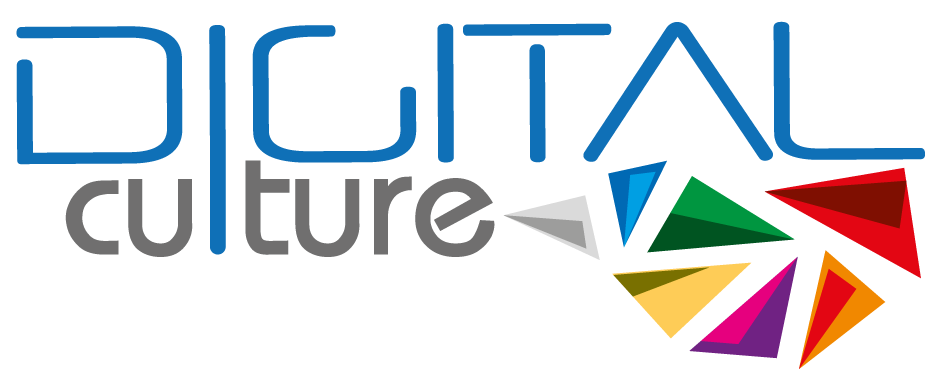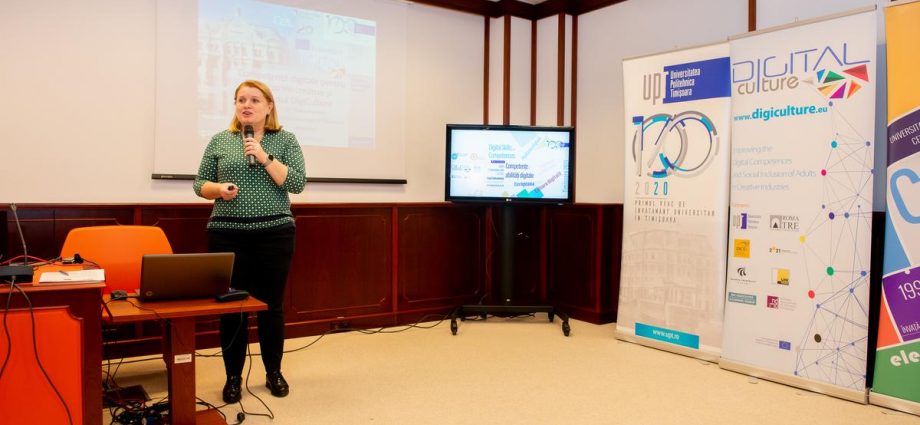The Politehnica University of Timisoara through the e-Learning Center together with the Multimedia Center have organized the fourth edition of the Digital Skills and Competences workshop on Digital Culture, Europeana and Timișoara 2021 on Friday, December 13th. The event was attended by dozens of participants and was broadcasted online, through live streaming on the Facebook platform.
With dozens of international speakers from the US, Europe and Romania, the workshop was addressed to all actors in the field of creative industries, people in the field of culture, artists, students, teachers in university and pre-university education.
The presentations of this workshop were part of the strategy of the Erasmus + DigiCulture project – “Improving the Digital Competences and Social Inclusion of Adults in Creative Industries”, to build a free online course.
Speakers within the workshop presented practical examples of use and integration of digital elements, of virtual and augmented reality (AR & VR) applications in education, culture and promoting cultural heritage, and also in creative industries. The focus was on Europeana collections, applications for storing cultural objects, how Timisoara2021 will be present in Europeana, but also methods of using these collections in education.
Ways of attractively promoting museums, STEM and arts among young people, with the help of robotics, AR and VR applications have been presented with examples from Europe and Timisoara.
The digital strategy of Galway 2020 European Capital of Culture and opportunities for collaboration with artists from Ireland were also presented within the workshop.
The presentation of the project Spotlight Heritage Timișoara, which uses concepts such as digital heritage, integrated in web and mobile applications and the cultural involvement of communities was another point of interest.
The digital cultural data platform of Timisoara2021, the visual digital identity of the cultural programme dedicated to the European Capital of Culture, the preservation of individual and collective memories, the indexing, archiving of cultural data and the connection with Europeana were also launched on this occasion.
The event started with a welcoming speech of prof. dr. Radu Vasiu, director of the Multimedia Center, followed by associate professor dr. Florin Drăgan – the Rector of UPT, who spoke about the importance of investments in digitization. Dr. Diana Andone, director of CeL took the floor next and explained the significance of concepts such as “creative industries” or “digital skills” and talked about the Erasmus + Digital Culture project.
The Europeana Foundation was the main guest of the workshop, represented through Henning Scholz – Partner and Operations Manager, Europeana Foundation, who presented the European Digital Library and its cultural impact. The same subject was also approached by Dan Matei – National Heritage Institute of Europeana Romania, presenting the advantages and characteristics of the European Digital Library.
The topic aroused much interest from the audience in the room, the presentation being followed by a series of questions and discussions regarding the practices of using the digital library in Romania and copyright laws.
Prof. Antonella Poce, Head of the Center for Museum Studies, Università Roma Tre, Italy – told the audience about the Tito Rossini project and how soft skills were developed through the university’s collections of paintings.
Assoc. Prof. Mairéad Nic Giolla Mhichíl – Head of the Ideas Lab, National Institute of Digital Learning, Dublin City University, Ireland – presented the cultural impact achieved by the Digital Culture project in Ireland, by creating MOOC’s (Massive Open Online Courses) with linguistic and cultural features of the Irish language.
Assoc. Prof. Hendrik Knoche – Department of Architecture, Design and Media Technology, Aalborg University, Denmark – presented methods of using AR and VR technologies in education, through architecture, museums and digital heritage.
One of the most interesting and expected presentations of the workshop was the one of Denise Mc Donagh – Digital Programme Manager, Galway 2020 European Capital of Culture, who presented the digital strategy for Galway – European Cultural Capital 2020, but also the Atlantec programme.
Simona Fiț, Oana Romocea, Alexandra Forțiș and Radu Ticiu spoke about a series of initiatives to finance, promote and educate children and young people in STEM: the Știintesescu Contest, Romanian Science Festival, CoderDojo and BioCoderDojo.
Mark Frydenberg of Bentley University, USA presented the cultural projects implemented by Google and “walked” the audience through a series of international museums, virtually recreated through digital technologies.
Dr. Diana Andone then took the floor to present the Erasmus + Digital Culture project and the online surveys conducted by the CeL team.
Sorina Jecza – InterArt Triade Foundation delighted the public with a series of art works, animated with the help of augmented and virtual reality applications – the cultural project Himere valahe animate.
Prof.dr.ing. Carmen Holotescu – Ioan Slavici University – introduced the audience to blockchain technology and the types of projects carried out at European level through it. She also presented various possibilities of using this technology in the cultural field.
Dr. Diana Andone, Dr. Mugur Mocofan, Dr. Vlad Mihăescu, Dr. Silviu Vert – Politehnica University of Timisoara, together with Marius Cornea from the National Museum of Banat presented the digital applications realized within the project Spotlight Heritage Timisoara, a project that was implemented by the CeL and CM teams, together with the UPT students, in partnership with the National Museum of Banat and the Timișoara European Cultural Capital Association 2021.
Another highlight of the workshop was the launch of the Timisoara2021 Digital Cultural Data Platform. Being part of the programme that won the title Timișoara 2021 – European Capital of Culture, the platform was presented by members of the development team: Dr. Diana Andone, Dr. Andrei Ternauciuc and Dr. Mugur Mocofan (Polytehnica University of Timișoara).
At the end of the workshop, Chiara Zuanni – Graz University, Austria – spoke about the digital transformation of museums and the new forms of curation and public engagement.
The evening ended with a series of open questions and discussions with the audience in the room regarding the digital technologies presented.


